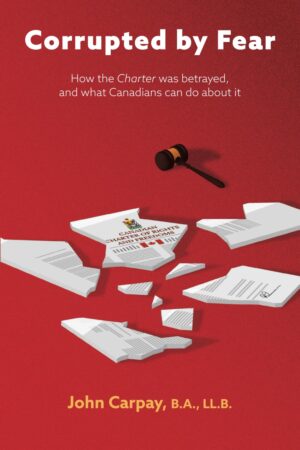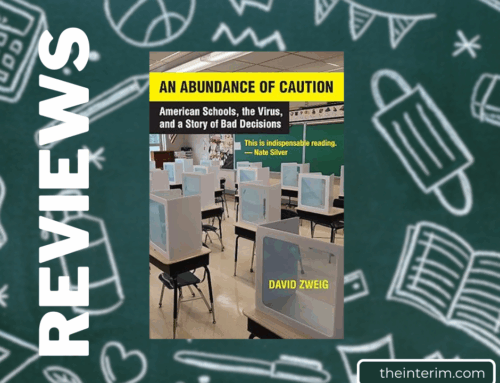Paul Tuns, Review:
Corrupted by Fear: How the Charter was Betrayed, and What Canadians Can Do about It
by John Carpay (Justice Center for Constitutional Freedoms, $24.95, 303 pages)
 John Carpay will be familiar to our readers as author of the popular Law Matters column in this paper. Many will know him as the founder and president of the Justice Center for Constitutional Freedoms, which has litigated on behalf of Canadians for their Charter rights when governments infringe upon them. He has written in great detail about his legal advocacy in these pages and the dangerous ideas that animate the state’s desire to curtail the freedoms of their citizens. In Corrupted by Fear: How the Charter was Betrayed, and What Canadians Can Do about It, Carpay has now offered a book-length examination of the many ways in which the federal, provincial, and local governments circumvented the freedoms ordinary Canadians took for granted until the COVID pandemic came along in 2020 and was used as pretext for trampling upon their Charter rights.
John Carpay will be familiar to our readers as author of the popular Law Matters column in this paper. Many will know him as the founder and president of the Justice Center for Constitutional Freedoms, which has litigated on behalf of Canadians for their Charter rights when governments infringe upon them. He has written in great detail about his legal advocacy in these pages and the dangerous ideas that animate the state’s desire to curtail the freedoms of their citizens. In Corrupted by Fear: How the Charter was Betrayed, and What Canadians Can Do about It, Carpay has now offered a book-length examination of the many ways in which the federal, provincial, and local governments circumvented the freedoms ordinary Canadians took for granted until the COVID pandemic came along in 2020 and was used as pretext for trampling upon their Charter rights.
Carpay describes the political and sociological context for the state restricting rights during the pandemic and points out the suspect “science” on which much of public policy was based, which the author calls the “triumph of fear over facts” and “triumph of visual images over reason.” The scaremongering guess – for that is what it was – of the UK’s Neil Ferguson and the images of sickly patients suffering from COVID, were used as the justification for draconian lockdowns. “Governments around the globe violated citizens’ rights and freedoms and inflicted significant harm on economies,” through lockdowns based on Ferguson’s estimate that if nothing was done to stop the spread of COVID, 40 million people might die. More than a year after COVID, many governments mandated that all residents “get injected with a new vaccine for which long-term safety data did not exist.” Carpay observes, “such was the power of fear.”
Not everyone feared COVID, but a critical mass of the population and almost all policy-makers and mainstream opinion leaders (journalists, celebrities, business leaders) did, with catastrophic consequences.
Governments ordering people around is nothing new. The state infringing on individual liberty is not novel. Carpay says that courts are important as remedies to the violation of constitutionally protected rights. But during COVID, the courts failed the public by time and again siding with the state in upholding its restrictions and coercions on people.
The second half of the book looks at these failings by courts across the country and at every level. Carpay explains that “judicial independence requires judges to be truth-loving and truth-seeking.” Hearing constitutional challenges, Carpay argues, courts should be as impartial as they are when hearing criminal cases. Instead, there was undue deference to the rationales providing by the state for limiting the Charter rights of Canadians.
Carpay charges judges with following media narratives and blindly accepting government explanations rather than considering the evidence brought before the courts countering the claims of the state that lockdowns and vaccine mandates were necessary to stop the spread of a virus that was not nearly as deadly as Ferguson predicted.
Carpay lists 12 claims – some might now call them COVID myths — that courts routinely accepted as fact, including unprecedented mortality rates, that lockdowns or vaccines were the only measures that could curb the spread of the virus, or that lockdowns were only a minor inconvenience. “In Charter challenges to lockdowns,” Carpay writes, “there was no compelling evidence put before Canadian courts by governments to substantiate any” of these 12 claims.
But it is worse than that. Carpay says, “worse than being baseless and unfounded, most if not all of the assumptions … are demonstrably false”: COVID was not unprecedented and did not substantially alter overall death rates; COVID presented no serious threat to children (or most healthy people); lockdowns caused serious harms; the Canadian healthcare system was not seriously threatened by COVID but rather by “is own long-standing dysfunction and incompetence.”
Carpay rehearses a number of legal cases in which judges blithely reasserted the popular narratives without any actual evidence to justify the infringement of Charter rights by government COVID mandates.
In one particularly egregious example of a court bending to popular narratives, Carpay tells the story of Judge Adam Germain of the Alberta Court of King’s Bench, who ordered pastor Artur Pawlowski to preface his criticisms of public policy with the line: “I am also aware that the views I am expressing to you on this occasion may not be views held by the majority of medical experts in Alberta.” He was also obliged to inform those within earshot “that the majority of medical experts favour social distancing, mask wearing, and avoiding large crowds to reduce the spread of COVID-19.” Carpay said even if the majority of health experts do hold these positions, it is not the judge’s place to blindly accept them as truth or that he should impel an individual to explicitly acknowledge their views. “Coerced speech,” argues Carpay, “is tyrannical.”
The message throughout the pandemic was that the public could “follow the science” by blindly obeying what the media and politicians were saying about COVID and how to stop its spread. That is a dubious proposition on its own. It becomes a crisis when judges blindly follow media and political narratives about the “science.”
Carpay describes Covidism as an ideology, “a belief system that exalts – fervently – one single aim over everything else.” Under Covidism, “everything had to give way to stopping the spread of a virus,” and the courts, as much as the media and the political class, got swept up in that ideology – with the cost paid by Canadians through the loss of their Charter rights and freedoms.




